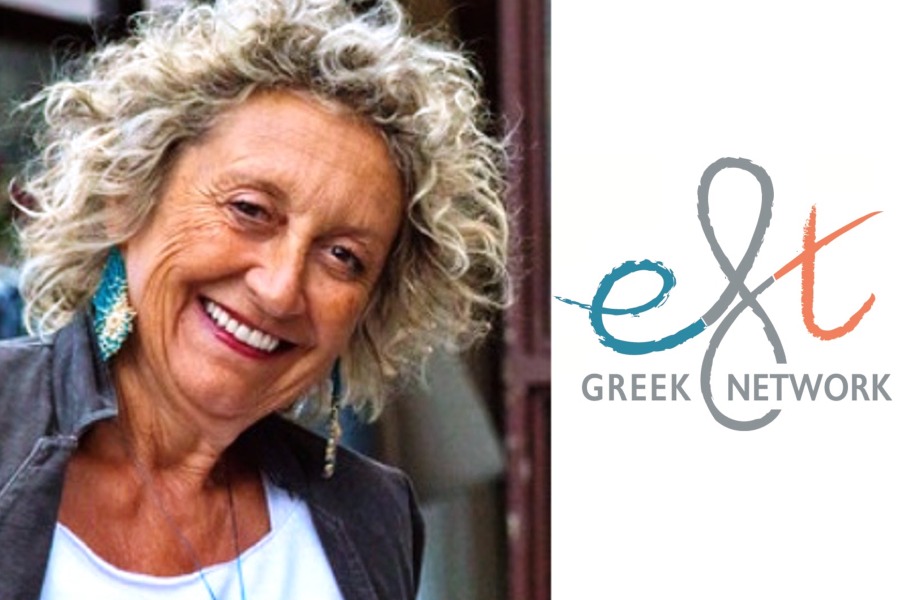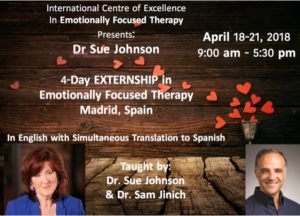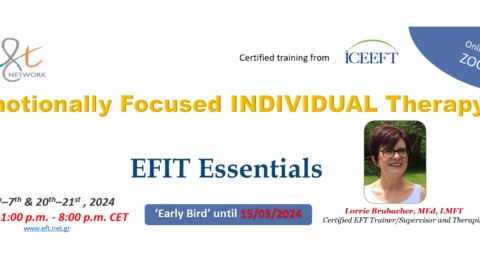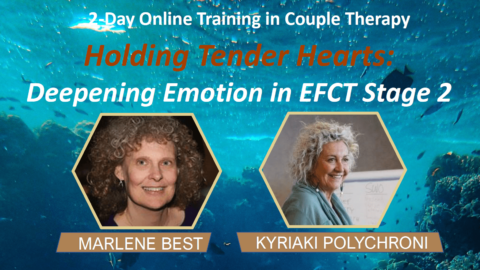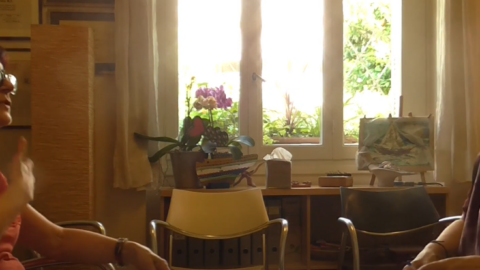- Psychologist – Psychotherapist and Trainer at The Athenian Institute of Anthropos
- Therapist, Supervisor and Trainer in Emotionally Focused Therapy (EFT), Certified by the International Centre for Excellence in Emotionally Focused Therapy (ICEEFT), Canada
- Past President of the European Family Therapy Association – EFTA
- Joint Editor of European Journal “Human Systems: the Journal of Therapy, Consultation and Training”
Question 1.
How would you describe a vibrant relationship between partners and in the family?
The most important foundation for a healthy, vibrant relationship is the feeling of secure emotional connection. This safe ground nurtures mutual acceptance, understanding and teamwork. It strengthens our connection with others and increases our sympathy by encouraging compassion and reducing aggression. So, partners and family members experience greater trust as well as physical and emotional wellbeing.
This secure emotional bond between partners creates a “harbor” where each partner can seek refuge and comfort from the struggles of life – a safe haven of acceptance and love. Simultaneously, it becomes a launching point from which partners charge into the outside world and assert their personal goals. Fulfillment of our need for connection and care is the fundamental element in every meaningful, significant relationship. The more connected one feels to their partner, the more unique and independent they can be.
Furthermore, the sense of security partners experience in a healthy relationship is related to increased emotional self-control: partners express less reactivity and defensiveness and become more supportive towards each other.
Essentially couples in a secure and vibrant relationship can and do respond positively to three basic questions:
Accessibility: Will you be there for me when I need you?
Responsiveness: Will you accept me and sense my emotional needs?
Engagement: Will you be emotionally present and involved?
The anxiety caused by not knowing where our partner stands with respect to these questions is the scaffolding that supports our conflicts and keeps us apart.
Question 2.
What is the cause of conflict in relationships today? How can conflicts be resolved? Can you give us an example?
A tsunami of loneliness, anxiety and depression is devastating modern societies. One of the principal sources of conflict in relationships today is the extreme emphasis given to “independence” – being someone who can do everything by him or herself – “all in one”. This extreme often involves a feeling of shame related the need for another, a sense of weakness that leads to distance and isolation. However, as Susan Johnson, founder of Emotionally Focused Therapy (EFT), mentions in her latest book “The meaning of Love”, “this wonderful isolation is for planets and not for people”.
Recent findings in Neuroscience conclude that the human brain is intrinsically programed to seek connection with others – love is a connection bond, an ordained and wise survival tactic. The very first human instinct is neither sex nor aggression – as past theories believed – but the need for emotional bonding.
In the past, but even today still, this need was defined as emotional dependence and was regarded by psychologists and therapists as pathology. Today, we know that “functional dependence” is our greatest source of strength. To become “the best you can and wish to be” is only truly possible when you are deeply and safely connected to someone important to you.
Question 3.
How can one correct/heal and enhance adult love relationships?
Changing and healing an adult love relationship begins with the acceptance of a revolutionary, new perspective about relationships: that adult love is, at its core, a bond exactly like the one between a mother and a child.
In other words, all recent studies on adult love relationships narrate the same story: that majestic love involves the strong desire for intimacy and the need of a safe haven that reduces fear and anxiety of abandonment and loneliness, especially in a world full of challenges, as it is today.
The latest conclusions in Natural and Social Sciences come as an answer to the negative view of bonding as a dependency, which was popular when we were growing up. These findings offer a revolutionary perspective on erotic love that is heartening and practical for both couples and therapists – as it proves that human beings are by their very own nature genetically programed to function with compassion rather than selfishly and that our innate predisposition is to feel connected to and for others.
Furthermore, in order for a couple to succeed in healing, strengthening and developing a more fulfilling relationship, partners must understand the strange “mathematics” behind adult love relationships – by no means is the responsibility for the relationships shared on 50{e3cdc9d4ea5d855c34f25520257cd3ac79fbb31cc7ab4197eefdbec7eece3503} – 50{e3cdc9d4ea5d855c34f25520257cd3ac79fbb31cc7ab4197eefdbec7eece3503} basis. As a couple, each partner has their own 100{e3cdc9d4ea5d855c34f25520257cd3ac79fbb31cc7ab4197eefdbec7eece3503} responsibility for the relationship. So, each partner needs to be sincere and also brave enough to assume full responsibility for their actions including the consequences their actions cause to the other partner. Next, both partners must realize the vicious circle they create together – the cycle of negative interaction – that causes them emotional distress and keeps them at a distance
Each partner needs to recognize their own feelings related to the negative cycle in the relationship, the fear, pain, grief and longing for connection, to express these feeling to his / her partner including the loneliness – and through this sincere sharing of feelings, as partners risk showing their vulnerability, a couple can move on to transform their relationship bond.
None of us are very comfortable with our vulnerability – we have learnt to value feeling and looking strong. It is not easy to express the “primary” deeper feelings of fear, rejection, grief and loneliness. We have been taught, through family life and socialization that these feelings present weakness and must not be revealed. What we usually express are the “secondary” – more reactive – feelings, anger and frustration. In this way we either become critical and demanding towards the other person or we isolate and pretend not to care. In reality however, it is the expression of these more vulnerable, primary feelings that brings us closer to our partner and creates trust and safety. While expression of anger and secondary feelings pushes us further apart and our relationship becomes competitive or / and detached.
Question 4
Which are, in your opinion, the most common problems in couple therapy? How can these problems be resolved?
The most common problem in couple therapy is when partners are constantly fighting, caught in an escalating conflict and don’t understand the messages they are trying to communicate to each other. Therefore, each partner feels unappreciated and rejected. In these moments of conflict, one partner usually becomes critical and demanding – the one called in EFT the “pursuer”– and the other shuts down and becomes withdrawn – the one called the “withdrawer”. Next, a repetitive cycle of negative interaction emerges, where the more one pursues, criticizes and protests, the more the other withdraws and disconnects and the more one withdraws, the more the other probes and protests. This is a very widespread pattern among couples who actually care for each other. Partners who fall into this pattern are not sick or immature. They are trapped in a vicious circle where they both become overwhelmed by intense feelings they cannot control in order to express them to each other in a way that reveals the underlying need for connection, acceptance and reassurance.
Question 5
What role do feelings play in adult love relationships? How can feelings simultaneously be the problem and the solution?
Feelings can become a problem when partners express them in a forceful and inappropriate way as this threatens the relationship and causes each partner to feel rejected.
On the other hand, when feelings are expressed in a way that reveals our longing for our partner and our vulnerability, they dissolve the distress in the relationship.
Feelings are the essence of love – the music of the dance of emotional connection between partners.
We cope with our feelings by bonding in the way we are taught as children. How we bond emotionally as well as the type of bond, determine the way we connect with our partner and how we express our sexuality. So, feelings, how we cope with and express them, also influence sexuality.
Recent scientific research verifies that in the process of love there is continual interaction between emotion, brain and body. Sexuality involves and is dictated by both feelings and attachment needs to such an extent that, as we say in EFT, “synchronized, fulfilling sex begins outside the bedroom” – meaning, it begins with the partners’ safe emotional bond, that will allow them to feel comfortable and intimate enough to experiment sexually in all stages of their relationship.
Question 6
How does the unhappy relationship of a couple influence the children and their development?
Conflict and hostility expressed among parents influences children and their development. When there is no safe emotional bond in the adult love relationship and partners are sad and lonely, a child may channel all of her / his energy into reassuring and supporting one of the parents, neglecting however his / her personal development. In family therapy this is described as the “child – super parent” dynamic where the child, an unsuspecting witness of the parents’ negative feelings, becomes “the parent of the parent”.
Additionally, fighting or distance among partners can cause various fears in children, some of which may be expressed specifically (fear of certain animals, fear of other people etc.), or more generally (anxiety, bed wetting, eating disorders etc.).
Question 7
Do hopeless cases exist? Can you give us an example?
The most challenging situations, the most difficult – and sometimes impossible – to resolve are those cases involving ongoing physical abuse, prolonged and continuous substance abuse and progressing love affairs.
A foundation of safety is necessary in a relationship so that partners can open up and express their feelings. This security cannot exist among partners when there is ongoing physical abuse or one of them feels that the other seeks comfort in a chemical substance or another love affair. However if these behaviors have stopped and both partners are committed to fighting for their relationship, then, they can be helped to use this experience to “heal” their wounds and co–create a more fulfilling relationship.
Question 8
How often do people ask for help in order to enhance their adult love relationship? Based on your experience, do you believe people speak honestly about the problems they face in their relationships? Do they speak the truth?
In today’s world a great number of couples seek help to strengthen their relationship. The modern couple is the basic unit of society while in the past it was the extended family and the community. The modern couple carries many varied and demanding duties to perform in today’s society and needs support and care.
EFT is internationally one of the most extensively used models in couple therapy and with great success. My couple therapy experience, in Greece and especially with EFT, has shown me that when a therapist develops the skills necessary to create a feeling of safety in the therapy room, then partners – women and men –talk with great honesty and express their feelings. This safety offers them the hope they need to change, together, the negative dynamics, the vicious circle in their relationship and to rediscover their mutual love, their sense of acceptance and caring for each other.
Question 9
What kind of training do you offer a Croatian therapist with EFT?
The EFT training I will offer will provide knowledge on couples’ dynamics and will encourage the development of specific skills so the therapist can work with couples in a deeply emotional way that will help them change their relationships.
I am very happy I will be teaching EFT to therapists of your country. From previous visits, I feel that Croatian culture, reflected in couple and family dynamics, has a lot in common with my Greek culture.
Both cultures are being lead through a transition away from more traditional roles while models relate in a more modern and postmodern way. This transition often creates difficulties and problems for all of us as partners.
EFT is an approach compatible to our cultures because it focuses on taking advantage of feelings in relationships – we are Balkans and thankfully, we have emotional people.



